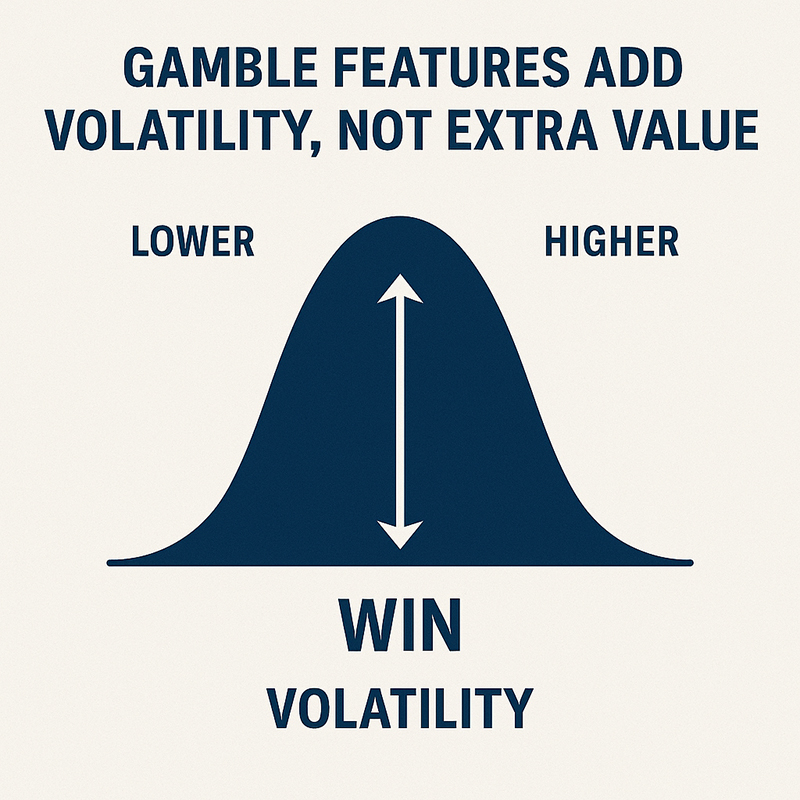
Random Number Generators, and Gamble Features
- Every Spin is Independent — No Memory, No Hot Streaks
- Compensated vs. Random: The UK Machine Divide
- Gamble Features Add Volatility, Not Extra Value
RNG’s in UK Slot Machines
If you’ve ever wondered whether UK slots are “on a timer,” “due,” or somehow nudged by the operator, the short answer is: reputable games are driven by a Random Number Generator (RNG) that decides outcomes independently on every spin. The detail gets interesting, especially when you look at the differences between online (“remote”) games and land-based machines, and how gamble ladders, hi/lo, and pie gambles sit on top of the RNG.
RNG basics: pseudo-random, seeded, and scaled
Modern slots use a pseudo-random number generator: a software algorithm that continuously produces long sequences of numbers at high speed. The stream is seeded (initialised) so that results pass industry randomness tests, and it runs continuously in the background. When you press Spin, the game reads the current RNG value(s) and maps (scales) them to game outcomes—e.g., a reel stop on each reel, or the result of a pick, card draw, or wheel segment. “Scaling” is just the conversion from a large numeric range (say 1–100,000) to the set of possible outcomes for that game (e.g., 1–52 for cards, or specific reel stops). Gambling Commission
Two crucial implications:
-
Independence: each spin or feature decision is independent of the last—no memory, no “hot/cold” streak logic in properly certified random games.
-
Distribution control: long-run probabilities are built into the paytable and reel strips (or virtual reels). The RNG simply samples those probabilities fairly.

UK regulatory lens: remote vs land-based
The UK distinguishes between remote (online) games and various land-based categories (B3, B4, C, D, etc.). This matters because it affects how the RNG may be used.
-
Online/remote casino and bingo RNGs must be “acceptably random” and must not be adaptive (compensated). “Adaptive/compensated” means altering probabilities in response to previous results to steer the game toward a target return in the short term. Remote standards explicitly prohibit this.
-
Land-based machines can achieve their stated RTP in two ways: (1) fully random control (as above), or (2) feedback compensation (“compensated games”) that gently adjusts probabilities to meet the target RTP over tens or hundreds of thousands of plays; if a B3/B4 game uses compensation, the player must be told—for example with the message, “THIS GAME IS COMPENSATED AND MAY BE INFLUENCED BY PREVIOUS PLAY.”
All categories still require testing and certification, but the key takeaway is: online slots are always non-compensated; some land-based games may be compensated, and must disclose if so.
RTP, volatility, and what randomness really looks like
-
RTP (Return to Player) is the long-run average proportion of stake returned as prizes. There’s no statutory minimum RTP for gaming machines, but the stated RTP must be achieved over time. Regulators and test houses monitor performance (e.g., “live RTP monitoring”) to check that actual returns track the design. In a fully random model, you need a lot of play for the maths to converge; in compensated models, convergence can be quicker by design.
-
Volatility (variance) is how bumpy the ride feels: high-volatility games deliver rarer but larger hits; low-volatility games pay more frequently at smaller sizes. RNGs drive both styles the same way—through different paytables and reel mapping—not by “tight/loose” switches per day.

How the RNG decides a spin (simplified)
-
RNG generates a number (or set of numbers) continuously.
-
On Spin, the game samples the current numbers.
-
The numbers are scaled to reel stops or feature outcomes.
-
The paytable converts that symbol combination into a prize (or triggers a feature).
-
The meter updates and the next spin awaits—again, independent of the last.
Gamble features: ladders, hi/lo, pie gambles and more
UK slots and pub machines often offer secondary gambles after a win—classic examples are hi/lo cards, gamble ladders, and pie gambles. Regulators describe these as secondary gambles because they occur after the primary gamble (the base spin) and only risk funds won in that game. If you add new money, you’ve started a new primary gamble. This framing matters for fairness and metering.
How the RNG is used in gambles:
-
Each step of a gamble is another independent RNG draw at the published probabilities. A 50/50 “double or nothing” should, in theory, have ~50% success per step (minus any house rule like caps or forced collect points).
-
For categories like A/B1 (and by extension similar expectations across regulated categories), standards require that any Double-Up/Gamble options return what is displayed or suggested. In practice, that means the RNG must be tuned so the long-run return of that gamble matches the on-screen odds/ladder.
-
On compensated land-based titles, the overall game may be steered toward RTP across a cycle, but each gamble decision is still RNG-driven at the game’s configured odds. Where compensation exists, disclosure is required (see above), and links between games (e.g., held states) must follow strict rules to prevent engineered “win runs.”

Does using the gamble change the RTP?
-
Online (remote) slots: The published RTP must account for the game as offered. If a gamble is optional, designers typically include it in a way that doesn’t increase expected value versus taking the win—what it does is change volatility (fewer, bigger outcomes if you gamble; more, smaller ones if you collect). Some games publish an RTP range covering different player choices. (Regulatory guidance focuses on clear rules and fair disclosure rather than mandating how players must use the gamble.)
-
Land-based compensated games: The machine aims at the stated RTP for the whole game cycle (base plus features/gambles). Whether you gamble or collect shifts your personal variance; the long-run maths is controlled at game level, and compensation (where used) accelerates convergence to the target.
Myths busting
-
“It’s due to pay”: Not on random games. Each spin is independent. On compensated land-based titles, there is feedback to meet RTP over time, but you cannot usually read or predict where you are in that cycle as a player; disclosure rules exist, and the game still uses RNG for each decision.
-
“The spin button timing changes results”: The RNG is spinning regardless; your press simply samples it. There’s no “skill timing” that beats a certified RNG. Although your outcome will be different depending when you press the button, the random outcome is still ‘random’ and unpredictable.
-
“Gamble ladders are rigged”: They’re RNG-driven at stated odds and independently tested. Your risk goes up as steps increase, but the long-run return of each step must match the displayed proposition.
What the UK regulator and test houses actually do
Licensed operators must submit games—including RNG test results—to the Commission (and use approved test labs) before going live. Ongoing monitoring (e.g., live RTP checks) helps ensure the game performs as designed. Online titles must meet the Remote Technical Standards, including RNG properties like uniformity and unpredictability; land-based categories must meet their Gaming Machine Technical Standards (and, where relevant, clearly label compensated behaviour).
If you’re gambling in arcades, treat every spin and every gamble as independent, never “due,” and view gambles as volatility tools rather than value boosters. An interesting side-note: Players who believe random games are ‘due’ generally spend more than players who believe they are random.